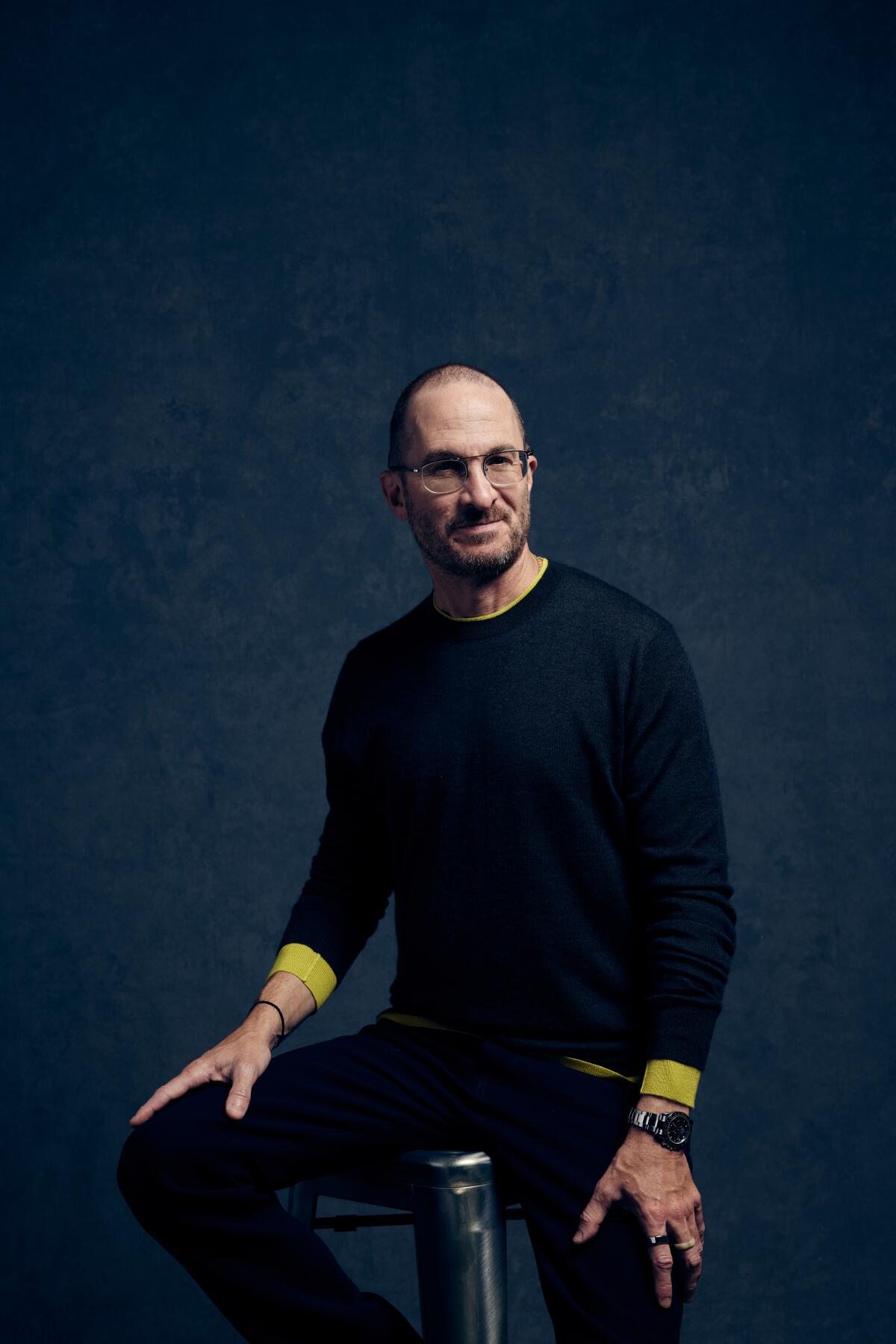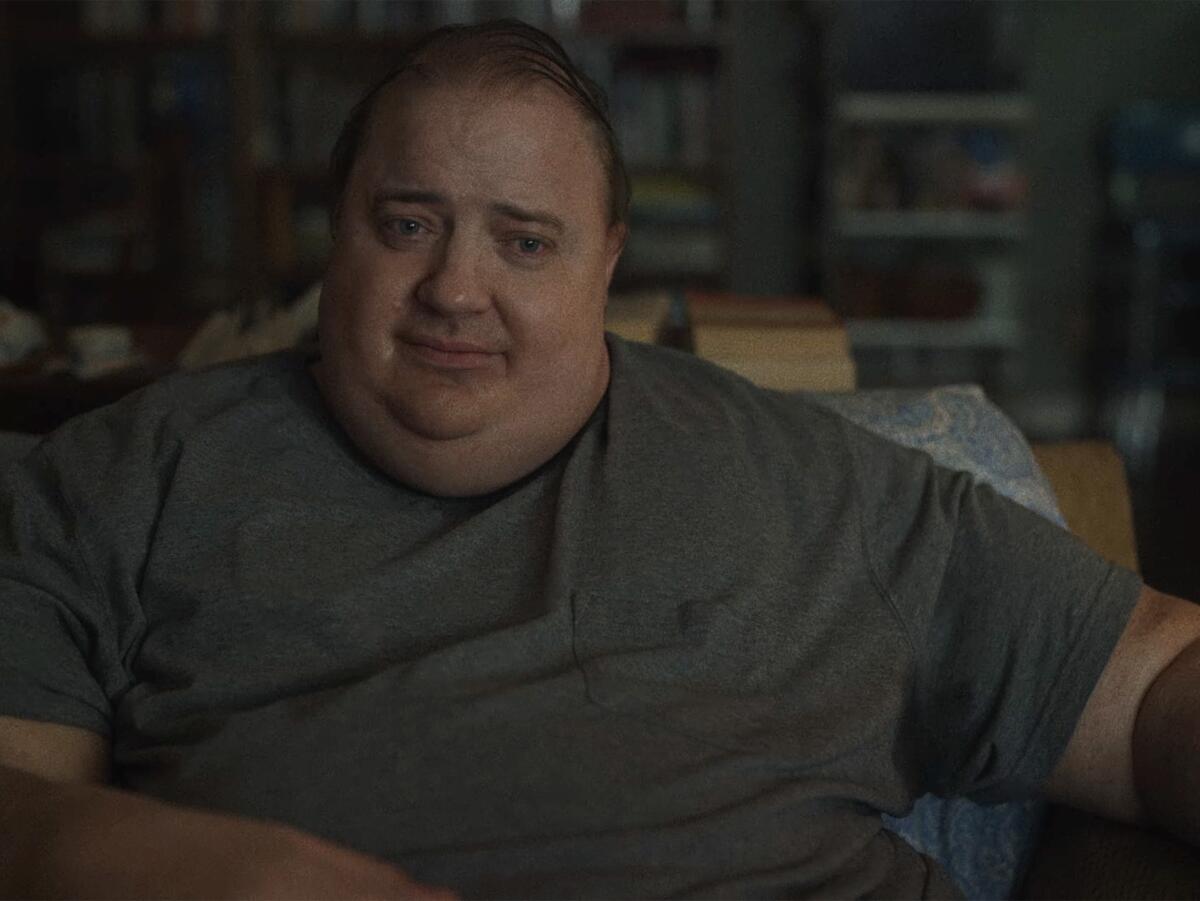The church of Darren Aronofsky, where ‘connection,’ ‘empathy,’ ‘love’ are the sermon

- Share via
Director Darren Aronofsky has a way of opening up performers to new emotional depths, explorations of inner pain that often seem to surprise even the actors themselves. So it has been with “The Whale,” featuring a celebrated lead performance by Brendan Fraser.
In a recent interview for The Envelope podcast, Aronofsky said he didn’t anticipate what he called the “Brenaissance,” the outpouring of long-standing affection for Fraser. In the film, Fraser plays Charlie, a man whose weight has grown to some 600 pounds, putting his health at extreme risk. His main goal becomes to repair the relationship with his teenage daughter, Ellie (Sadie Sink), who has never forgiven Charlie for leaving her and her mother (Samantha Morton) for a man. Charlie struggles to make the most of the time he has left.

You first saw “The Whale” onstage, and then you approached playwright Sam Hunter about turning it into a film. What drew you to it?
I remember reading the review in the New York Times and being like, “Wow, what a bizarre, crazy story to try to bring to the stage. What a unique character.” So I was fascinated to go see it. And when it started, it was just characters that I, on the surface, could never understand or relate to, but by the end of the play, my heart was broken and I knew these characters like I knew members of my family.
I was deeply moved by the play. And so the next day, I reached out to Sam, and we got together. And I knew it would be a challenge to turn this into cinema, but — the amazing thing about movies, what I really love about cinema is that it is this great exercise in empathy and that you can watch a movie about any person in the world, and if it’s an honest, truthful portrayal, you will be brought into their life, into their circumstance. Because we’re all human.
I don’t want to get ahead of ourselves, but you have previously directed four actors to Academy Award nominations, and Natalie Portman won an Oscar for her role in “Black Swan.” What is it you feel like you do with actors that gets them to these performances?
It’s a collaboration. It’s what I love to do. I’m a terrible musician, but if I could be playing backup bass for the Rolling Stones, I’d be there in a minute. I just love to jam.
So I love working with actors because they are musical instruments in that they can do this incredible stuff with their emotions and bring it out. It’s almost a sacred time between “action” and “cut,” when the actor is opening up and the crew is totally focused, and you have these incredible artists in the crew and technicians that are just so focused on capturing and creating this one moment. And when that alchemy is happening, it’s church for me.
There’s been some criticism of the casting of Brendan Fraser and the film’s depiction of obesity. Did that surprise you?
The film is from the heart of Sam Hunter, who lived his experience and brought his personal experience to the screen. And I had Sam with me the entire journey, from writing the screenplay, adapting his own work, to being with me every day on set, to watching cuts and being with me, and has become a great friend and someone who I was able to ask anything of, and so was Brendan.
It comes down to the question of: Should certain stories be told? This is an exercise in empathy. What I love about Sam’s writing is, through all of his characters in all of his plays that have incredible challenges, there is this incredible hope for the world. And what I love about Charlie is there’s not an ounce of cynicism in Charlie. There is such a beautiful creature inside of him that is trying to do good in the world, to love in the world. But he’s a very flawed character. He’s selfish. He’s made lots of mistakes in his life. But he really, really, really wants to give something back. And I felt that this was a story that should be told. And it comes down to the question of: Should we tell stories that allow audiences to get into the hearts and souls of characters that most of us judge the second we see them?
I think if it does that, if it changes one [person] to look and say, “Oh, I know someone like that. I’ve met Charlie, and there’s a human here, and not this creature that isn’t human” — which is crazy that we even have to say that, that there is that type of prejudice in the world. I just hope people come with an open heart and pay attention and connect with Charlie and that this film will change people. I really think it can help the conversation.
You have a reputation as somebody who makes these dark, difficult films, and here, one of the last lines in the movie is, “People are amazing.” Do you see this as your most hopeful movie?
I think in the tragedy of the films I’ve made earlier, there is a lot of positivity. I think Hubert Selby Jr., “Requiem for a Dream,” is all about love and what goes wrong. And so I do think that’s in the work.
I think the lessons of COVID that pulled us all apart — also all the political stuff that was ripping us all apart — is human connection is paramount. We are connected, but the fact that we’re so disconnected in so many different ways, just trying to remind each other that with all of those gulfs, there is a way back. That with all of Ellie’s pain and distrust and sadness and anger, that she can find love — hopefully can inspire us. It’s definitely inspired me.
More to Read
Sign up for The Envelope
Get exclusive awards season news, in-depth interviews and columnist Glenn Whipp’s must-read analysis straight to your inbox.
You may occasionally receive promotional content from the Los Angeles Times.











